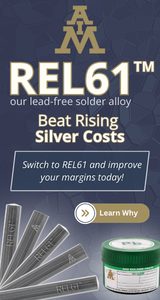| Sponsor |

|
Reclaim Your Factory's Future
Space is a precious resource. With SELECT Synchro, reclaim it, and reimagine your factory's workflow for greater efficiency and scalability.
Nordson Electronic Solutions
|
|
| Sponsor |

|
From Slave to Master: flexible ISM integrations
ESSEGI AUTOMATION's ISM software integrates with 250+ brands, connecting ERP, MES, WMS, Pick & Place and X-Ray systems. Flexible logic allows it to operate as master or slave in any production flow.
Essegi Automation
|
|
| Ask the Experts |
|
|
May 24, 2010 - Updated
May 24, 2010 - Originally Posted
Lead-Free Profile on Tin/Lead Assemblies
We recently reflowed a batch of tin/lead soldered circuit board assemblies using a lead-free profile. The lead-free profile temperatures were significantly higher than specified for these tin/lead assemblies. The assemblies appear fine, but we're concerned with reliability.
Would you scrap these board assemblies?
What additional testing can we do to confirm the long term reliability of these assemblies?
C. T.
|
| Expert Panel Responses |
Subjecting boards that have been assembled with Sn/Pb to a typical Pb Free thermal profile should, in principle, not result in questionable solder joints. But there are a number of considerations:- It is assumed that this was an assembly process using solder paste. The flux incorporated in Sn/Pb solder pastes is formulated to follow a particular thermal profile that causes certain process steps to occur sequentially, namely: evaporation of vehicle, activation of flux, ramp up to and soak at soldering temperature for a given period of time prior to cool-down.
The question has to be asked as to whether this Sn/Pb paste formulation would work the same waywhen subjected to the Pb Free reflow thermal profile. Probably - especially since "the assemblies appear fine"- but that is somewhat subjective.
- Apart from flux considerations, the Sn/Pb alloy would certainly not dissolve as much copper from the substrate at the higher temperatureas would the Pb Free alloy which is much richer in Sn.
Consequently, to the extent that it is important, the creation of Cu/Sn intermetallic compounds would be reduced as compared to Pb Free.
- What is the effect of the elevated thermal profile on the assembly? If it can satisfactorily be reflowed using Pb Free solder paste and thermal profile without damaging the board or components then there should be no concern that those with Sn/Pb solder will suffer.
The reflow oven performs the same way regardless of the solder alloy that passes through it.
As regards testing for long term reliability, the same tests as those used on the Pb Free assemblies should be valid for the Sn/Pb assemblies.
Would I scrap them? It would depend on their value and how confident I am of the tests carried out.

|
Harold Hyman
Consultant
VJ Electronix
Harold Hyman has been involved in metallurgical aspects of the electronics industry since the 1950's, and in semiconductor development and engineering for STL, Ediswan & RCA. He later joined HTC, a pioneer of vapor phase soldering and continued industry experience Dynapert, GenRad, Teradyne, SRT and VJ Electronics.
|
|
Submit A Comment
|
Comments are reviewed prior to posting. You must include your full name to have your comments posted. We will not post your email address.
|
Free Newsletter Subscription
Circuitnet is built for professionals who bear the responsibility of looking ahead, imagining the future, and preparing for it.
Insert Your Email Address
|
| Sponsor |

|
AI Void Detection - X-Ray Inspection
X-ray Inspection for hidden and buried solder joints. BGA, QFN, THT, and more. High Speed and High Resolution configurations available.
Test Research, Inc.
|
|
|





